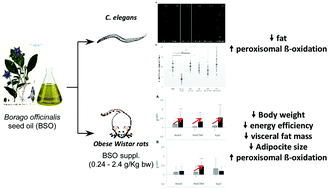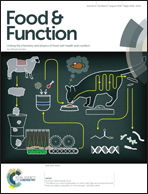Borago officinalis seed oil (BSO), a natural source of omega-6 fatty acids, attenuates fat accumulation by activating peroxisomal beta-oxidation both in C. elegans and in diet-induced obese rats†
Abstract
Obesity is a medical condition with increasing prevalence, characterized by an accumulation of excess fat that could be improved using some bioactive compounds. However, many of these compounds with in vitro activity fail to respond in vivo, probably due to the sophistication of the physiological energy regulatory networks. In this context, C. elegans has emerged as a plausible model for the identification and characterization of the effect of such compounds on fat storage in a complete organism. However, the results obtained in such a simple model are not easily extrapolated to more complex organisms such as mammals, which hinders its application in the short term. Therefore, it is necessary to obtain new experimental data about the evolutionary conservation of the mechanisms of fat loss between worms and mammals. Previously, we found that some omega-6 fatty acids promote fat loss in C. elegans by up-regulation of peroxisomal fatty acid β-oxidation in an omega-3 independent manner. In this work, we prove that the omega-6 fatty acids’ effects on worms are also seen when they are supplemented with a natural omega-6 source (borage seed oil, BSO). Additionally, we explore the anti-obesity effects of two doses of BSO in a diet-induced obesity rat model, validating the up-regulation of peroxisomal fatty acid β-oxidation. The supplementation with BSO significantly reduces body weight gain and energy efficiency and prevents white adipose tissue accumulation without affecting food intake. Moreover, BSO also increases serum HDL-cholesterol levels, improves insulin resistance and promotes the down-regulation of Cebpa, an adipogenesis-related gene. Therefore, we conclude that the effects of omega-6 fatty acids are highly conserved between worms and obesity-induced mammals, so these compounds could be considered to treat or prevent obesity-related disorders.



 Please wait while we load your content...
Please wait while we load your content...